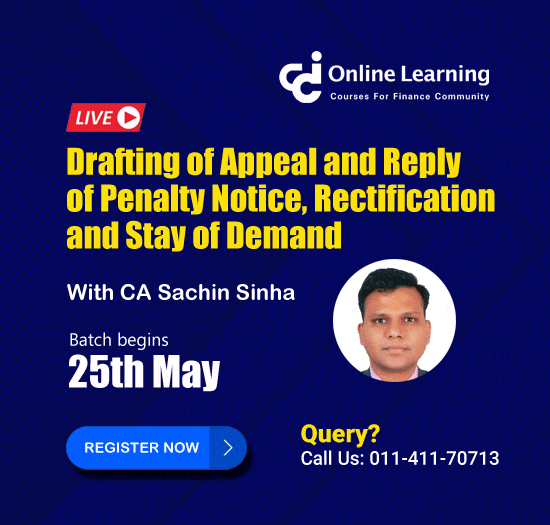Filing an income tax appeal before the Income Tax Appellate Tribunal (ITAT) is a crucial step for taxpayers seeking resolution on disputed tax matters. The relevant section that governs the filing of an appeal before the ITAT is Section 253 of the Income Tax Act. Here's an overview of Section 253:
Section 253: Appeal to the Appellate Tribunal
1. Who can File an Appeal
Any assessee aggrieved by an order passed by the Assessing Officer (AO) or Joint Commissioner or Commissioner of Income Tax (Appeals) (JCIT(A)) or the Principal Commissioner or the Commissioner of Income Tax or Principal Chief Commissioner or Chief Commissioner of Income Tax can file an appeal to the ITAT. Similarly, the Principal Commissioner or Commissioner of Income Tax can also file an appeal to the ITAT against certain orders.
Appeal can be filed by the Income tax Department before ITAT, High Court and Supreme Court, if the amount of tax effects exceeds the below monetary limit:-
- Before the ITAT - 50 Lakh
- Before the High Court - 1 Crore (For question of law)
- Before the Supreme Court - 2 Crore (For question of law)
In case of Assessee these limits are not applicable therefore the Assessees can file appeal before ITAT, HC and SC without any limit. No appeal related to question of facts entertain beyond ITAT i.e any appeal related to question of facts cannot entertained before HC and SC. Only appeal related to question of law is entertain before HC and SC.

2. Cases where an appeal can be filed
The following orders are appealable before the ITAT:
- Orders passed by the Joint Commissioner of Income Tax (Appeals) or Commissioner of Income Tax (Appeals) u/s 250, 270A, 271A, 271AAC, 271AAD, 271J, 154, 271AAB, 272A.
- Penalty Order passed by the Commissioner of Income Tax (Appeals).
- Orders passed by the Principal Chief Commissioner or Commissioner or Principal Director General or Director General or Principal Director or Director of Income Tax u/s 263, 272A, 154.
- Orders passed by the Assessing Officer as per the directions of the Dispute Resolution Panel.
- Orders passed by the Assessing Officer u/s 115VZC(1), 143(3)/147.
- Penalty order passed by the Commissioner.
- Application for stay of tax demands.
3. Time limit for filing appeal or memorandum of cross objection
Every appeal to ITAT has to be filed within 60 days from the date of communication of the order, which is the subject matter of the appeal, to the assesse or Principal Commissioner or Commissioner, as the case may be.
The respondent to an appeal should file a memorandum of cross-objections with the ITAT within 30 days of receipt of notice from the ITAT.
4. Fees and form for filing Appeal
A person filing an appeal with the ITAT should pay the following appeal filing fee.
|
Case |
Prescribed Fees |
|
|
(i) |
Where the total income of the assessee as computed by the Assessing Officer in the case to which the appeal relates is Rs. 1,00,000 or less |
Rs. 500 |
|
(ii) |
Where the total income exceeds Rs. 1,00,000 but is not more than Rs. 2,00,000 |
Rs. 1,500 |
|
(iii) |
Where the total income is more than Rs. 2,00,000 |
1% of the assessed income, subject to a maximum of Rs. 10,000. |
|
(iv) |
In any other case |
Rs. 500 |
|
(v) |
Where appeal is filed to the Appellate Tribunal by an Assessing Officer on the direction of the Commissioner or Principal Commissioner, against the order of the Joint Commissioner (Appeals) or the Commissioner (Appeals) under section 154 or 250 |
No fees |
|
(vi) |
Filing of memorandum of cross-objections |
No fees |
|
(vii) |
Application for stay of demand |
Rs. 500 |
The form prescribed for filing appeal is Form No. 36 and for filing cross-objections is Form No. 36A. The ITAT may accept a delayed submission of Form No. 36A depending on the facts and circumstances of the appeal.
5. How to file form no. 36 online
Go to the www.itat.gov.in. Log in to your account by entering your User ID and password if not available then create it first. Although there is option to file Form 36 i.e. Appeal before ITAT is available but still after filling online its printout with signed of the Assessee needs to submit before ITAT office physically in 3 copies. Alternatively we can file manual form 36 and submit.
6. Identify Grounds of Appeal
Clearly understand the grounds on which you are filing the appeal. This may include, but not limited to, disputing the assessment order, challenging additions or deductions made by the tax authorities, or questioning legal interpretations. Important point to note here that Ground of appeal can’t change before ITAT whatever grounds of appeal filed before CIT(A) need to submit appeal before ITAT on same grounds only. It is discretionary power of ITAT to accept additional ground of appeal.
7. Representation before the ITAT
The appellant and respondent can seek representation from an authorized person to appear for the hearing before the ITAT. Section 288 of the Income Tax Act, 1961 prescribes the persons who can act as an authorized representative. Here Chartered Accountants and Advocates are authorized to represent the case before ITAT. We should file written submission in triplicate at least before 10 days from date of hearing before ITAT so that on the date of hearing your matter can discuss in detail. We should file Power of Attorney (PoA) in advance before appearing in hearing before ITAT.
8. Presentation of Evidence
None of the parties is eligible to file additional evidence before the ITAT. In case, the ITAT requires any document, affidavits or seeks to examine any witnesses, the ITAT may allow for the production of documents or examination of persons or other evidence.
9. Order by the Appellate Tribunal
The Appellate Tribunal pass such orders on any appeal as it thinks fit, after giving a reasonable opportunity of being heard to both the parties.
10. Rectification by the Appellate Tribunal
The Appellate Tribunal may amend any order passed by it within 6 months from the end of month in which order was passed, with a view to rectify any mistake apparent from the record.
However, where the amendment is related to enhancing the liability or reducing the refund, the tribunal shall not pass any order unless an opportunity of being heard is given to the assessee.
11. Time Limit for disposal of Appeal
The Appellate Tribunal may hear and decide such appeal within a period of 4 years from the end of the Financial Year in which such appeal is filed.
Conclusion
Income Tax Appellate Tribunal (ITAT) is a quasi-judicial authority to file appeals against the orders of income tax authorities. The ITAT is the final fact-finding authority i.e. any decision of the ITAT is final when it concerns factual matters.








 CAclubindia
CAclubindia

